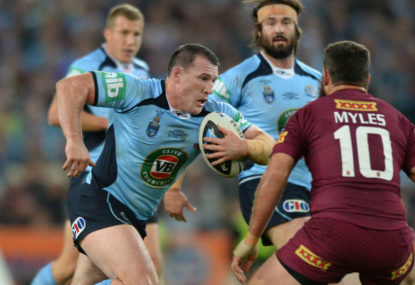JackJumpers' NBL title was special - but where does it sit among Tasmania’s top ten sporting moments?
It’s a pretty good time to be a Tasmanian sports fan right now. After years in the sporting wilderness with not much to celebrate,…

As the monetary rewards for professional athletes have increased, the need for them to concern themselves with a post-sporting life has diminished.
Even by the time many finish their sporting careers, they have earned enough to set themselves up for life. There is therefore no need to bother with education.
But is that good for the athletes themselves?
After an interesting discussion around our table at the recent University of Queensland Sporting Blues awards, the subject of athleticism and scholarship was to the fore.
Interestingly, the winners of the Sporting Blues were often students who also had high grades in their studies. Obviously they are people who pursue excellence in everything that they do.
Indeed many have sung the virtues of a so-called traditional combination of athleticism and scholarship in ancient Greece. In preparing to write this column I researched that subject only to come a across a learned paper suggesting that there was no such thing.
Whether it exists or not, there were arguments that night suggesting that there surely is a role for education to play in providing a proper balance in the life of professional athletes.
We heard of research being done at the university with a particular group of professional athletes aimed at helping them cope with the pressures of their training regime.
It was pointed out for example that these athletes often have a tough training session in the morning, then go home and relax until the afternoon when they have another vigorous session.
By the time they have completed it, they are pinging and find it difficult to sleep. Hence sleeping pills are not unfamiliar territory for many of them.
The University of Queensland is looking at how that time between sessions might be better utilised to help the brain to shut down in the evening. Not surprisingly, study and an intellectual challenge is something that could well play a big role.
There seems little doubt that while we exercise the body we often forget that the brain needs stimulation as well.
The days of amateur and semi-professional sport produced many well rounded individuals who were able to achieve at the highest level in sport and then do the same thing in a completely different field such as medicine, science or the arts.
I recall reading a newspaper article in the late sixties where it pointed out that all of the members of the Wallabies team were university graduates apart from one, who was an accountant. At that stage accountancy was a course done at a technical college rather than at a university.
Of course it was vital that they had something to fall back on when their sporting careers were over. The result was that they contributed to the community in many ways. I was able to benefit from the expertise of Dr Geoff Chapman well after his Wallaby days were over – both as my doctor and from his rugby expertise by playing in a Dubbo team with him.
Last week I wrote of David Thiele, whose medical career has probably even outshone his extraordinary efforts of winning a gold medal in the 100 metres backstroke at successive Olympic Games.
Many of today’s top athletes won’t need that education but those who might avail themselves of it can make an enormous contribution to society.
That’s where I admire the achievements of Wallaby John Roe. The Australian and Queensland back-rower has been able to follow in the footsteps of those men who played for Australia but also did a degree in medicine. And he has done it in the era of full professionalism in the sport.
It meant that he took medical books with him on tour and no doubt would have had to put up with some ribbing from teammates. What a sense of satisfaction he must have had when he graduated MBBS (Bachelor of Medicine, Bachelor of Surgery) at the University of Queensland in 2006.
Obviously he had the inspiration to be a doctor. At the same time there surely must be benefits for professional athletes in studying, even though it may not lead to such a stunning career shift.
Top-class athletes thrive on challenges. If they have a challenge that exercises their brain at the same time as their training is exercising their body, they may well end up happier and even be a better player.
And if that brain has been exercised in the middle of the day it might be more ready to shut down after that physical afternoon hit-out.
Greek tradition or Greek myth, there is a lot to be said about combining athleticism and scholarship.